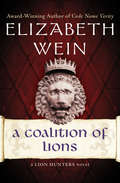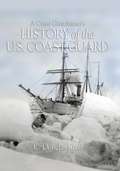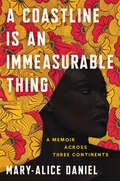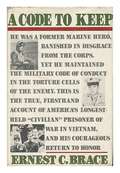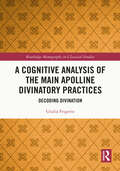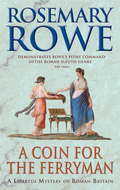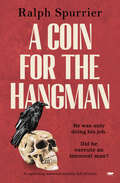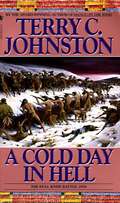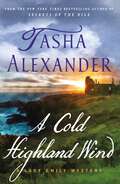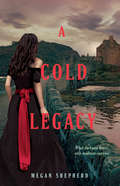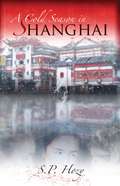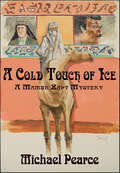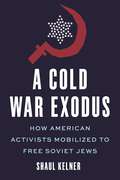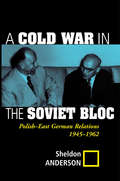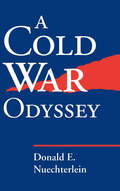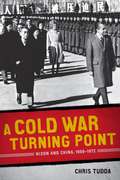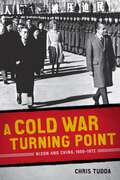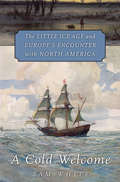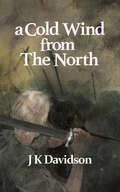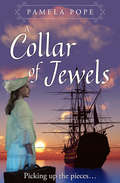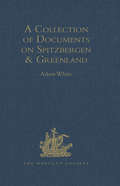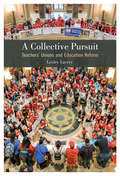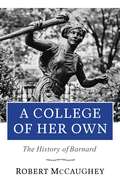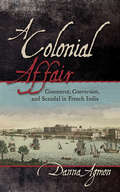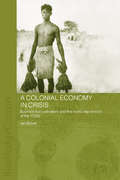- Table View
- List View
A Coalition of Lions (The Lion Hunters Novels #2)
by Elizabeth WeinCaught between two kingdoms, Princess Goewin must balance the demands of leadership with those of her own happinessWith her own kingdom in upheaval and her vicious aunt out for blood, Goewin, princess of Britain and daughter of High King Artos, flees to the British-allied African kingdom of Aksum. There, she meets with her fiancé, Constantine, Britain&’s ambassador to Aksum, who is next in line for the throne of Britain. But Aksum is undergoing its own political turmoil, and Goewin soon finds herself trapped between two countries, with the well-being of each at stake. When she learns of another heir to the British throne, she must handle the precarious situation with great care—for the sake of her own happiness as well as for the safety of her people. This ebook features an illustrated biography of Elizabeth Wein including rare images from the author&’s personal collection.
A Coast Guardsman's History of the U.S. Coast Guard
by Douglas KrollMore a book about Coast Guard heritage than an academic history, this book focuses on a variety of relatively unknown Coast Guardsmen who personify the service's core values. The author highlights the contributions of a variety of individuals, from seamen to admirals on active duty, as well as Reserves, Auxiliarists, and civilian members of Team Coast Guard. These heroes, representing a great diversity in age, sex, race, and ethnicity, set an example worthy of emulation and serve as role models for today's Coast Guard men and women.
A Coastline Is an Immeasurable Thing: A Memoir Across Three Continents
by Mary-Alice DanielA poetic coming-of-age memoir that probes the legacies and myths of family, race, and religion—from Nigeria to England to AmericaMary-Alice Daniel’s family moved from West Africa to England when she was a very young girl, leaving behind the vivid culture of her native land in the Nigerian savanna. They arrived to a blanched, cold world of prim suburbs and unfamiliar customs. So began her family’s series of travels across three continents in search of places of belonging.A Coastline Is an Immeasurable Thing ventures through the physical and mythical landscapes of Daniel’s upbringing. Against the backdrop of a migratory adolescence, she reckons with race, religious conflict, culture clash, and a multiplicity of possible identities. Daniel lays bare the lives and legends of her parents and past generations, unearthing the tribal mythologies that shaped her kin and her own way of being in the world. The impossible question of which tribe to claim as her own is one she has long struggled with: the Nigerian government recognizes her as Longuda, her father’s tribe; according to matrilineal tradition, Daniel belongs to her mother’s tribe, the nomadic Fulani; and the language she grew up speaking is that of the Hausa tribe. But her strongest emotional connection is to her adopted home: California, the final place she reveals to readers through its spellbinding history.Daniel’s approach is deeply personal: in order to reclaim her legacies, she revisits her unsettled childhood and navigates the traditions of her ancestors. Her layered narratives invoke the contrasting spiritualities of her tribes: Islam, Christianity, and magic. A Coastline Is an Immeasurable Thing is a powerful cultural distillation of mythos and ethos, mapping the far-flung corners of the Black diaspora that Daniel inherits and inhabits. Through lyrical observation and deep introspection, she probes the bonds and boundaries of Blackness, from bygone colonial empires to her present home in America.
A Code To Keep
by Ernest C. BraceThis is the true story of a man's lonely triumph over adversity. Ernest C. Brace was a decorated Marine pilot, the first to fly one hundred missions in the Korean War. A little more than five years later, however, a fateful accident and a hastily made decision stripped him of his rank, and he was dishonorably discharged from the Marines. <P><P>Vowing to regain his lost honor, he flew secret supply missions to Laos as part of a C.I.A. operation during the Vietnam War. Captured in a surprise attack by the Pathet Lao, Brace was imprisoned and brought to an isolated outpost in North Vietnam, where he was confined in a bamboo cage, his head, hands, and feet bound. Though a civilian, he made it a point to live by the Military Code of Conduct: he resisted the enemy whenever he could, and attempted escape three times. But each run for freedom only led to crueler torments upon capture. <P><P>In this extraordinary memoir of courage, sacrifice, and the will to survive, Ernie Brace recounts his experiences in a way that is stirring, inspiring, and memorable. A CODE TO KEEP is destined to stand out as one of the key documents of America's involvement in Vietnam.
A Cognitive Analysis of the Main Apolline Divinatory Practices: Decoding Divination (Routledge Monographs in Classical Studies)
by Giulia FrigerioThis volume takes an innovative interdisciplinary approach to investigating divination procedures at sanctuaries of Apollo in Classical and Hellenistic Greece, merging neuroscience, psychology, and behavioural studies with archaeology. Through a deep analysis of primary sources and the historical and cultural context of these procedures, Frigerio reconstructs the precise schemata of knowledge and cognitive associations pertaining to ancient visitors of the Oracle, highlighting neural inputs they received inside their minds in these specific situations. The author engages with the archaeological record, studying the cognitive input that both seekers and prophets experienced from features of the outside world such as landscape, architecture, and temperature. This innovative methodology allows for a new understanding of divinatory practices and the formulation of new hypotheses. In addition, this study offers a powerful tool for decoding divination and engaging with the archaeological record in future research. A Cognitive Analysis of the Main Apolline Divinatory Practices is a fascinating read for students and scholars working on divination and cognition in ancient Greek religion, as well as in religion in the Classical and Hellenistic periods more broadly.
A Coin For The Ferryman: A thrilling historical mystery
by Rosemary RoweBook nine in Rosemary Rowe's Libertus series: 'A cracking tale with a fast-moving plot' CONN IGGULDEN. In Roman Britain, AD 189, every slave knows his lot in life depends solely on the morals - or lack of morals - of his master. Fortunately for one young Glevum slave, Junio, his owner, former slave turned pavement-maker Libertus, believes heartily in rewarding years of loyalty and service. Junio is to be granted his freedom in an elaborate ceremony at the Basilica Law Court. And what better moment than the manumission to announce the lad's engagement? But the young couple's happiness is threatened by a terrible omen: the gruesome discovery of a corpse, hastily concealed in a shallow grave. Who is it? And, more importantly, who will go to any lengths to cover up their heinous crime? Determined to solve the mystery before the impending nuptials, Junio joins his mentor Libertus in trying to piece together a truly masterful mosaic of murder...
A Coin for the Hangman: A captivating historical mystery full of twists
by Ralph SpurrierA bookseller finds an old diary containing a condemned man&’s last words—but can they be trusted? &“A compelling book, superbly plotted&” (Peter Lovesey, author of The Last Detective). Browsing through a collection of old volumes, a bookseller comes across a diary—contained in it, the final words of a man sentenced to die for murder, addressed to his executioner. But after reading the journal, the bookseller wonders if there was a miscarriage of justice? Did the wrong man go to the gallows? And is there any way to prove it?A Coin for the Hangman is a &“mesmerising and thought provoking&” work of historical fiction, rich in detail and character, that delves into questions of duty, war, innocence, and guilt (Crime Fiction Lover).A Recommendation of the Walter Scott Prize Academy &“A fiendishly clever plot set in the aftermath of World War II. I thoroughly enjoyed it.&” —Minette Walters, Edgar Award–winning author of The Sculptress &“Capital punishment seems so alien to modern Britain that it is a shock to be reminded that just over fifty years ago there was a middle-aged man in a middle-ranking job in a London office who, two or three times a year, was paid six guineas to visit one of Britain&’s prisons and kill one of the prisoners. . . . A disturbing and poignant little novel.&” —Historical Novels Review &“A very moving piece of fiction.&” —Crimesquad
A Cold Day In Hell: The Plainsmen
by Terry C. JohnstonGathering his officers at Fort Laramie, Phil Sheridan prepares for the winter campaign for the sole purpose of capturing the elusive Sioux Chief Crazy Horse, whose exploits have put the U.S. Cavalry to shame.
A Cold Highland Wind: A Lady Emily Mystery (Lady Emily Mysteries #17)
by Tasha AlexanderIn this new installment of Tasha Alexander’s acclaimed Lady Emily series set in the wild Scottish highlands, an ancient story of witchcraft may hold the key to solving a murder centuries later.In the summer of 1905, Lady Emily, husband Colin Hargreaves, and their three sons eagerly embark on a family vacation at Cairnfarn Castle, the Scottish estate of their dear friend Jeremy, Duke of Bainbridge. But a high-spirited celebration at the beginning of their stay comes to a grisly end when the duke’s gamekeeper is found murdered on the banks of the loch. Handsome Angus Sinclair had a host of enemies: the fiancée he abandoned in Edinburgh, the young woman who had fallen hopelessly in love with him, and the rough farmer who saw him as a rival for her affections. But what is the meaning of the curious runic stone left on Sinclair’s forehead?Clues may be found in the story of Lady MacAllister, wife of the Laird of Cairnfarn Castle, who in 1676 suddenly found herself widowed and thrown out of her home. Her sole companion was a Moorish slave girl who helped her secretly spirit her most prized possessions—a collection of strange books—out of the castle. When her neighbors, wary of a woman living on her own, found a poppet—a doll used to cast spells—and a daisy wheel in her isolated cottage, Lady MacAllister was accused of witchcraft, a crime punishable by death. Hundreds of years later, Lady Emily searches for the link between Lady MacAllister’s harrowing witchcraft trial and the brutal death of Sinclair. She must follow a trail of hidden motives, an illicit affair, and a mysterious stranger to reveal the dark side of a seemingly idyllic Highland village.
A Cold Legacy
by Megan ShepherdWith inspiration from Mary Shelley's Frankenstein, this breathless conclusion to the Madman's Daughter trilogy--perfect for fans of Libba Bray--explores the things we'll sacrifice to save those we love . . . even our own humanity.After killing the men who tried to steal her father's research, Juliet--along with Montgomery, Lucy, Balthazar, and a deathly ill Edward--has escaped to a remote estate on the Scottish moors. Owned by the enigmatic Elizabeth von Stein, the mansion is full of mysteries and unexplained oddities: dead bodies in the basement, secret passages, and fortune-tellers who seem to know Juliet's secrets. Though it appears to be a safe haven, Juliet fears new dangers may be present within the manor's own walls. Then she uncovers the truth about the manor's long history of scientific experimentation--and her own intended role in it--which forces her to determine where the line falls between right and wrong, life and death, magic and science, and promises and secrets. Juliet must decide if she'll follow her father's dark footsteps or her mother's tragic ones--or make her own.
A Cold Season In Shanghai
by S. P. HozyA time of turmoil, when destinies were forged… In this searing historical novel by Toronto author S.P. Hozy, set amid the turmoil of early twentieth century Shanghai, three women, one Russian, one Chinese, and one French, determine the tragic fate of a young piano prodigy. Which of them is really responsible? A Cold Season In Shanghai is set against the backdrop of revolution in China, when decadent Shanghai was like no other place on earth. The narrator is Tatiana, a Russian woman brought up in a wealthy family. Looking back on her actions thirty years later from her new life in Toronto, she recalls the complex relationships between the three women and the effect they had on each others lives. She suspects she may have been the catalyst for a series of devastating events which caused havoc in the lives of her friends. Tormented by the aftermath of her decision, she chooses to live a life of careless abandon, turning her back on her family and, ultimately, her friends.
A Cold Touch of Ice (Mamur Zapt Mysteries #13)
by Michael PearceThe world is changing around the Mamur Zapt, British Chief of Cairo's Secret Police. It's 1912 and there's a war on that no one's heard of. When an Italian man is murdered in the city's back streets, there is concern that this could be some kind of ethnic cleansing. "One of us" Morelli may have been, but was he "one of us" enough? And were the guns in his warehouse anything to do with it? Gareth Owen - the Mamur Zapt - has to find out fast.And then, as external pressures crowd in, other difficult questions arise. What is Trudi von Ramsberg really doing in Cairo? Not to mention that other noted traveller, Gertrude Bell, or the irritating little archaeologist, T.E. Lawrence? And why has the post of Khedive's Librarian suddenly become so important?As Cromer's Egypt gives way to Kitchener's Egypt, Morelli is not the only one who has problems over where his allegiance lies. Maybe the solution is for Owen to go to Zanzibar....
A Cold War Exodus: How American Activists Mobilized to Free Soviet Jews
by Shaul KelnerWinner of The 74th National Jewish Book Award: American Jewish Studies Celebrate 350 AwardReveals the mass mobilization tactics that helped free Soviet Jews and reshaped the Jewish American experience from the Johnson era through the Reagan–Bush yearsWhat do these things have in common? Ingrid Bergman, Passover matzoh, Banana Republic®, the fitness craze, the Philadelphia Flyers, B-grade spy movies, and ten thousand Bar and Bat Mitzvah sermons? Nothing, except that social movement activists enlisted them all into the most effective human rights campaign of the Cold War.The plight of Jews in the USSR was marked by systemic antisemitism, a problem largely ignored by Western policymakers trying to improve relations with the Soviets. In the face of governmental apathy, activists in the United States hatched a bold plan: unite Jewish Americans to demand that Washington exert pressure on Moscow for change.A Cold War Exodus delves into the gripping narrative of how these men and women, through ingenuity and determination, devised mass mobilization tactics during a three-decade-long campaign to liberate Soviet Jews—an endeavor that would ultimately lead to one of the most significant mass emigrations in Jewish history.Drawing from a wealth of archival sources including the travelogues of thousands of American tourists who smuggled aid to Russian Jews, Shaul Kelner offers a compelling tale of activism and its profound impact, revealing how a seemingly disparate array of elements could be woven together to forge a movement and achieve the seemingly impossible. It is a testament to the power of unity, creativity, and the unwavering dedication of those who believe in the cause of human rights.
A Cold War In The Soviet Bloc: Polish-east German Relations, 1945-1962
by Sheldon AndersonIn A Cold War in the Soviet Bloc, Sheldon Anderson uses recently declassified documents from Polish and East German communist party and foreign ministry archives to examine the interplay of national interests with the exigencies of communist party relations within the Soviet bloc during the Cold War. Anderson explores how Polish-East German relations were strained over the permanence of the Oder-Neisse border, the correct road to socialism, German repatriation from Poland, and trade policy; he provides an inside account of the heated debates that seriously divided the Polish and East German communists.Anderson delves into how and why the rift culminated in the return of the anti-Stalinist Wladyslaw Gomulka in October 1956, and he delineates how the Polish-East German conflict undermined the unity of the Soviet bloc on its most strategic flank. In doing so, he reveals the persistence of nationalism and ethnic prejudice in the former communist countries. In this timely text, Anderson pinpoints how nationalism has reemerged as a powerful political force following the end of the Cold War. With A Cold War in the Soviet Bloc, Anderson markedly fills the gap in the existing scholarship on postwar relations between the countries of East Europe.
A Cold War Odyssey
by Donald E. Nuechterlein“A fascinating ride through a period of history in which United States foreign policies and relationships matured greatly.” —Ralph C. Bledsoe, Special Assistant to the President, 1982–88The Cold War—that long ideological conflict between the world’s two superpowers—had a profound effect not only on nations but on individuals, especially all those involved in setting and implementing the policies that shaped the struggle. Donald Nuechterlein was one such individual and this is his story.Although based in fact, the narrative reads like fiction, and it takes the reader behind the scenes as no purely factual telling of that complex story can. Presented as the story of David and Helen Bruening and their family, A Cold War Odyssey carries us across three continents. Against a backdrop of national and international events, we follow the Bruenings through five decades as David’s governmental and academic assignments take them to all corners of the world.In the tradition of Herman Wouk’s Winds of War, the Bruenings’ personal and professional odyssey offers us a microcosm of world history in the second half of the twentieth century. Through the acute eyes of these participant observers, we see the partitioning of Europe after World War II, Korea and Vietnam, Watergate and Iran, the fall of the Berlin Wall and the reunification of Germany, the collapse of the Soviet Union and, with it, the end of the Cold War. With each succeeding episode, our understanding of the causes and consequences of international struggle is deepened through the Bruenings’ experience.
A Cold War Turning Point: Nixon And China, 1969-1972
by Chris TuddaIn February 1972, President Nixon arrived in Beijing for what Chairman Mao Zedong called the "week that changed the world. " Using recently declassified sources from American, Chinese, European, and Soviet archives, Chris Tudda's A Cold War Turning Point reveals new details about the relationship forged by the Nixon administration and the Chinese government that dramatically altered the trajectory of the Cold War. Between the years 1969 and 1972, Nixon's national security team actively fostered the U. S. rapprochement with China. Tudda argues that Nixon, in bold opposition to the stance of his predecessors, recognized the mutual benefits of repairing the Sino-U. S. relationship and was determined to establish a partnership with China. Nixon believed that America's relative economic decline, its overextension abroad, and its desire to create a more realistic international framework aligned with China's fear of Soviet military advancement and its eagerness to join the international marketplace. In a contested but calculated move, Nixon gradually eased trade and travel restrictions to China. Mao responded in kind, albeit slowly, by releasing prisoners, inviting the U. S. ping-pong team to Beijing, and secretly hosting Secretary of State Henry Kissinger prior to Nixon's momentous visit. Set in the larger framework of international relations at the peak of the Vietnam War, A Cold War Turning Point is the first book to use the Nixon tapes and Kissinger telephone conversations to illustrate the complexity of early Sino-U. S. relations. Tudda's thorough and illuminating research provides a multi-archival examination of this critical moment in twentieth-century international relations.
A Cold War Turning Point: Nixon and China, 1969-1972
by Chris TuddaIn February 1972, President Nixon arrived in Beijing for what Chairman Mao Zedong called the "week that changed the world." Using recently declassified sources from American, Chinese, European, and Soviet archives, Chris Tudda's A Cold War Turning Point reveals new details about the relationship forged by the Nixon administration and the Chinese government that dramatically altered the trajectory of the Cold War. Between the years 1969 and 1972, Nixon's national security team actively fostered the U.S. rapprochement with China. Tudda argues that Nixon, in bold opposition to the stance of his predecessors, recognized the mutual benefits of repairing the Sino-U.S. relationship and was determined to establish a partnership with China. Nixon believed that America's relative economic decline, its overextension abroad, and its desire to create a more realistic international framework aligned with China's fear of Soviet military advancement and its eagerness to join the international marketplace. In a contested but calculated move, Nixon gradually eased trade and travel restrictions to China. Mao responded in kind, albeit slowly, by releasing prisoners, inviting the U.S. ping-pong team to Beijing, and secretly hosting Secretary of State Henry Kissinger prior to Nixon's momentous visit. Set in the larger framework of international relations at the peak of the Vietnam War, A Cold War Turning Point is the first book to use the Nixon tapes and Kissinger telephone conversations to illustrate the complexity of early Sino-U.S. relations. Tudda's thorough and illuminating research provides a multi-archival examination of this critical moment in twentieth-century international relations.
A Cold Welcome: The Little Ice Age and Europe’s Encounter with North America
by Sam WhiteWhen Europeans arrived in North America, the average global temperature had dropped to lows unseen in millennia and its effects—famine, starvation, desperation, and violence—were stark among colonists unprepared to fend for themselves. This history of the Little Ice Age in North America reminds us of the risks of a changing and unfamiliar climate.
A Cold Wind From The North
by J K DavidsonIn seventh century Wales, a young man must fight to prove himself. As the kingdoms of post-Roman Britain struggle for a new order, his chieftain father is called away to war and Rhun is left to care for his people. But soon he is tasked with a dangerous mission of his own. Gathering a small band of friends, he sets out into the unknown to face a deadly enemy, battle, and death.
A Collar of Jewels (Magna Large Print Ser.)
by Pamela PopeAbandoned by her husband in England, a desperate woman struggles to build a new life for herself . . . Born into a wealthy English family and raised in Chicago, Ellie is used to a life of luxury. When she met Max Berman, it was the best thing that had ever happened to her, but her father, president of the Union Atlantic Railroad Company, was absolutely against a marriage to the son of Russian Jews. Still, Ellie was determined to be with the man she loved—even if it meant sacrificing her fortune. Ellie and Max, along with their four-month-old son, William, journey across the Atlantic to Southampton, England to start a new life. Max, goes off to sort out the immigration papers, while Ellie waits with William and the luggage. But then more than several minutes pass, and the crowds have died down. He’s nowhere in sight. Then, a porter gives Ellie the shocking news that Max was seen boarding the ship returning to America . . . Desperate and penniless, Ellie seeks out her English grandfather, Sir Robert Cromer. Finding her way on her own will be a struggle—and so will banishing Max from her heart. But for the sake of her son, and herself, she is determined never to be at the mercy of a man again . . .
A Collection of Documents on Spitzbergen and Greenland: Comprising a translation from F. Martens' Voyage to Spitzbergen: a Translation from Isaac de la Peyrère's Histoire du Groenland: and God's Power and Providence in the Preservation of Eight Men in Greenland Nine Months and Twelve Days (Hakluyt Society, First Series)
by Adam WhiteThe first text is from an English collection published in 1694; the second from the Relation du Groenland, Paris, 1663; the third is the text of Edward Pelham's tract, London, 1631. The supplementary material consists of the 1855 annual report. This is a new print-on-demand hardback edition of the volume first published in 1855.
A Collective Pursuit: Teachers' Unions and Education Reform
by Lesley LaveryTeachers’ unions are the organizations responsible for safeguarding the conditions of teachers’ employment. Union supporters claim strong synergies between teachers’ interests and students’ interests, but critics of unions insist that the stance of teachers in collective bargaining may disadvantage students as unions reduce the power of administrators to manage, remove, reward or retain excellent teachers. In A Collective Pursuit, Lesley Laveryunpacks how teachers’ unions today are fighting for contracts that allow them to earn a decent living and build “schools all students deserve.” She explains the form and function of the nation’s largest teachers’ unions. Lavery then explores unionization campaigns in the Twin Cities charter schools. A Collective Pursuit also examines teacher strikes and contract negotiations, school finance and finance reform, and district and union attempts to address racial achievement gaps, to provide a context for understanding the economic, political, and demographic forces that inspire teachers to improve conditions for students. A Collective Pursuit emphasizes that while teachers’ unions serve a traditional, economic role, they also provide a vast array of valuable services to students, educators, parents, and community members.
A College of Her Own: The History of Barnard (Columbiana)
by Robert McCaugheyIn 1889, Annie Nathan Meyer, still in her early twenties, led the effort to start Barnard College after Columbia College refused to admit women. Named after a former Columbia president, Frederick Barnard, who had advocated for Columbia to become coeducational, Barnard, despite many ups and downs, became one of the leading women’s colleges in the United States.A College of Her Own offers a comprehensive and lively narrative of Barnard from its beginnings to the present day. Through the stories of presidents and leading figures as well as students and faculty, Robert McCaughey recounts Barnard’s history and how its development was shaped by its complicated relationship to Columbia University and its New York City location. McCaughey considers how the student composition of Barnard and its urban setting distinguished it from other Seven Sisters colleges, tracing debates around class, ethnicity, and admissions policies. Turning to the postwar era, A College of Her Own discusses how Barnard benefited from the boom in higher education after years of a precarious economic situation. Beyond the decisions made at the top, McCaughey examines the experience of Barnard students, including the tumult and aftereffects of 1968 and the impact of the feminist movement. The concluding section looks at present-day Barnard, the shifts in its student body, and its efforts to be a global institution. Informed by McCaughey’s five decades as a Barnard faculty member and administrator, A College of Her Own is a compelling history of a remarkable institution.
A Colonial Affair: Commerce, Conversion, and Scandal in French India
by Danna AgmonDanna Agmon's gripping microhistory is a vivid guide to the "Nayiniyappa Affair" in the French colony of Pondicherry, India. The surprising and shifting fates of Nayiniyappa and his family form the basis of this story of global mobilization, which is replete with merchants, missionaries, local brokers, government administrators, and even the French royal family.Agmon's compelling account draws readers into the social, economic, religious, and political interactions that defined the European colonial experience in India and elsewhere. Her portrayal of imperial sovereignty in France's colonies as it played out in the life of one beleaguered family allows readers to witness interactions between colonial officials and locals. Thanks to generous funding from Virginia Tech and its participation in TOME, the ebook editions of this book are available as Open Access volumes, available from Cornell Open (cornellopen.org) and other repositories.
A Colonial Economy in Crisis: Burma's Rice Cultivators and the World Depression of the 1930s (Routledge Studies in the Modern History of Asia #Vol. 28)
by Ian BrownThe book challenges the orthodox argument that rural populations which abandoned self-sufficiency to become single commodity producers, and were supposedly very vulnerable to the commodity price collapse of the 1930s Depression, did not suffer as much as has been supposed. It shows how the effects of the depression were complicated, varying between regions, between different kinds of economic actors, and over time, and shows how the 'victims' of the depression were not passive, working imaginatively to mitigate their circumstances.
